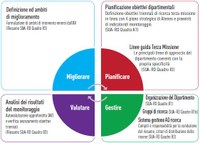
Internally, as well as in relations with other Universities and the institutions (MIUR, ANVUR, CRUI, CODAU…), the University promotes actions based on critical thought to ensure that Quality Assurance benefits from evaluations that are pertinent, fair, effective, sustainable and respectful of the specific contexts addressed.
The University of Bologna has established a Quality Committee, as required by current regulations, and a University Research Evaluation Committee (VRA Committee). The governing bodies of the University have considered it appropriate to make a distinction between the scope and functions of these committees, assigning self-assessment and internal quality assurance activities to the Quality Committee and the internal evaluation of (principally) the results of research to the VRA Committee.
With regard to QA, the approach adopted by the Quality Committee favours the gradual introduction of “quality” principles at primarily department management level: transparency, self-assessment, reporting of results with reference to parameters and documentary evidence. The Quality Committee promotes a culture of quality in order to facilitate self-assessment, offering support and advice so that Departments can define research and third mission objectives that are relevant to their situation and consistent with those specified in the Strategic Plan of the University.
The continuous improvement of the Quality Assurance management system involves four inter-related processes: planning, management, self-assessment and improvement.
The Third Mission is a new area of application of the quality assurance system that is monitored via its SUA-RD: in section I.0 of its SUA 2014 form, the University committed to work on both of the areas established by ANVUR:
- promotion of research,
- production of public assets of a social, educational and cultural nature.
In the 2016-2018 Strategic Plan, the University confirms its commitment to maintain constant dialogue with the territory served by its structures and to work intensively to disseminate scientific and cultural knowledge and awareness.
- Roles and responsibilities within the quality assurance system for research and the third mission
- Management of Departmental Research and Third Mission activities
- Management of University Research and Third Mission activities
- Deadlines for internal and external requirements - research and third mission
